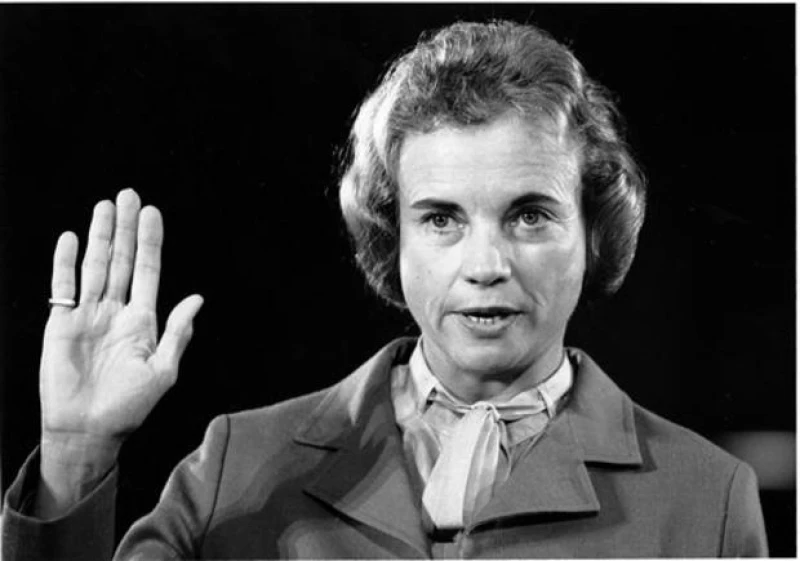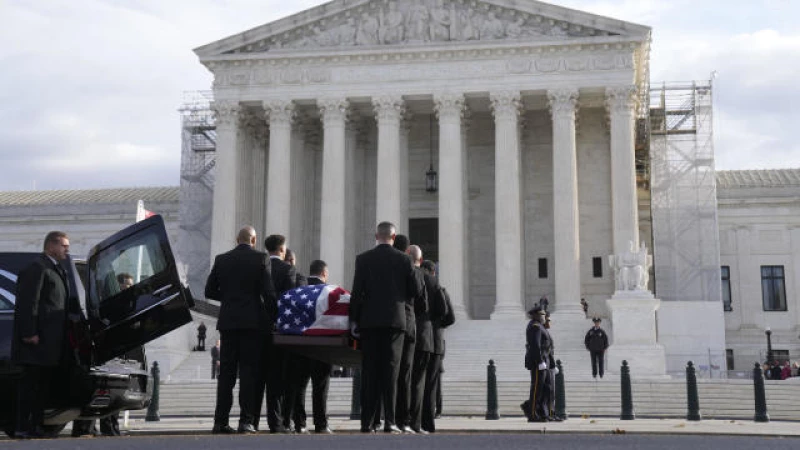Justice Sandra Day O'Connor Lies in Repose at Supreme Court
The late Justice Sandra Day O'Connor, the first woman to serve on the Supreme Court and an unwavering voice of moderate conservatism for more than two decades, is lying in repose in the court's Great Hall on Monday.
O'Connor, an Arizona native, died Dec. 1 at age 93.
Her casket was carried up the steps in front of the court, which was lined by her former clerks, and passed under the iconic words engraved on the pediment, "Equal Justice Under Law," before being placed in the court's Great Hall. A private ceremony was held before the hall opened to the public, allowing people to pay their respects afterward, from 10:30 a.m. to 8 p.m. All nine members of the current court and retired Justice Anthony Kennedy attended the private remembrance.
The last justice who lay in repose at the court was Ruth Bader Ginsburg, the second female justice. After her death in 2020, during the coronavirus pandemic, mourners passed by her casket outside the building, on the portico at the top of the steps.
Funeral services for O'Connor are set for Tuesday at Washington National Cathedral, where President Biden and Chief Justice John Roberts are scheduled to speak.
The Legacy of Justice Sandra Day O'Connor
Sandra Day O'Connor made history in 1981 when she became the first female Supreme Court Justice. Nominated by President Ronald Reagan and confirmed by the Senate, O'Connor broke the 191-year streak of male exclusivity on the high court. Despite being relatively unknown on the national scene prior to her appointment, she quickly became a prominent figure, receiving more letters in her first year than any other member in the court's history.
O'Connor's influence on the court was significant, as she often favored states in disputes with the federal government and frequently sided with police in cases involving claims of rights violations. One of her most notable contributions was her support for upholding and reaffirming the landmark Roe v. Wade decision, which established a constitutional right to abortion. However, three decades later, a more conservative court would overturn Roe v. Wade.
In addition to her stance on abortion, O'Connor also authored the majority opinion in the 2003 case Grutter v. Bollinger, where the court ruled that the Constitution allows the limited use of race in admissions decisions. However, in recent years, the court's conservative majority has taken a different approach, leading to the end of affirmative action in higher education.
Outside of her legal career, O'Connor had a rural upbringing on a ranch in Arizona. She developed a strong, independent spirit through her experiences riding horses, rounding up cattle, and operating trucks and tractors on the family's sprawling property.
In Memory of a Trailblazing Woman
She was a top-ranked graduate of Stanford's law school in 1952, but quickly discovered that most large law firms at the time did not hire women. One Los Angeles firm offered her a job as a secretary.

She built a career that included service as a member of the Arizona Legislature and state judge before her appointment to the Supreme Court at age 51. When she first arrived, she didn't even have a place anywhere near the courtroom to go to the bathroom. That was soon rectified, but she remained the court's only woman until 1993.
She retired at age 75, citing her husband's struggle with Alzheimer's disease as her primary reason for leaving the court. John O'Connor died three years later, in 2009.
After her retirement, O'Connor remained active, sitting as a judge on several federal appeals courts, advocating for judicial independence and serving on the Iraq Study Group. President Barack Obama awarded her the Presidential Medal of Freedom, the nation's highest civilian honor.
She expressed regret that a woman had not been chosen to replace her, but lived to see a record four women now serving at the same time on the Supreme Court.
She died in Phoenix, of complications related to advanced dementia and a respiratory illness. Her survivors include her three sons, Scott, Brian and Jay, six grandchildren and a brother.
A request has been made by the family to contribute donations to iCivics, the organization she established to advocate for civics education.







